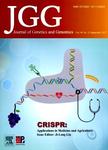Butyrate-induced GPR41 Activation Inhibits Histone Acetylation and Cell Growth
Butyrate-induced GPR41 Activation Inhibits Histone Acetylation and Cell Growth作者机构:Shanghai Engineering Research Center for Molecular Therapeutics and New Drug Development East China Normal University Shanghai 200062 China Institute of Chemical and Translational Genomics East China Normal University Shanghai 200062 China Shanghai Institute of Brain Functional Genomics MOE & STCSM Key Lab of Brain Functional Genomics East China Normal University Shanghai 200062 China
出 版 物:《Journal of Genetics and Genomics》 (遗传学报(英文版))
年 卷 期:2012年第39卷第8期
页 面:375-384页
核心收录:
学科分类:0710[理学-生物学] 07[理学] 09[农学] 071007[理学-遗传学] 0901[农学-作物学] 090102[农学-作物遗传育种]
基 金:supported by the grant from the National High-tech R&D Program(863 Program)(No.2007AA02Z163) the National Natural Science Foundation of China(No. 31000574) the Fundamental Research Fund for the Central Universities(No.78210042)
主 题:GPR41 Butyrate HDAC inhibitor Anti-proliferation Cell cycle arrest
摘 要:Butyrate has been recently identified as a natural ligand of the G-protein-coupled receptor 41 (GPR41). In addition, it is an inhibitor of histone deacetylase (HDAC). Butyrate treatment results in the hyperacetylation of histones, with resultant multiple biological effects including inhibition of proliferation, induction of cell cycle arrest, and apoptosis, in a variety of cultured mammalian cells. However, it is not clear whether GPR41 is actively involved in the above-mentioned processes. In this study, we generated a stable cell line expressing the hGPR41 receptor in order to investigate the involvement of GPR41 on butyrate-induced biochemical and physiologic processes. We found that GPR41 activation may be a compensatory mechanism to counter the increase in histone H3 acetylation levels induced by butyrate treatment. Moreover, GPR41 had an inhibitory effect on the anti-proliferative, pro-apoptotic effects of butyrate. GPR41 expression induced cell cycle arrest at the Gl-stage, while its activation by butyrate can cause more cells to pass the G1 checkpoint. These results indicated that GPR41 was associated with histone acetylation and might be involved in the acetylation-related regulation of cell processes including proliferation, apoptosis, and the cell cycle.



